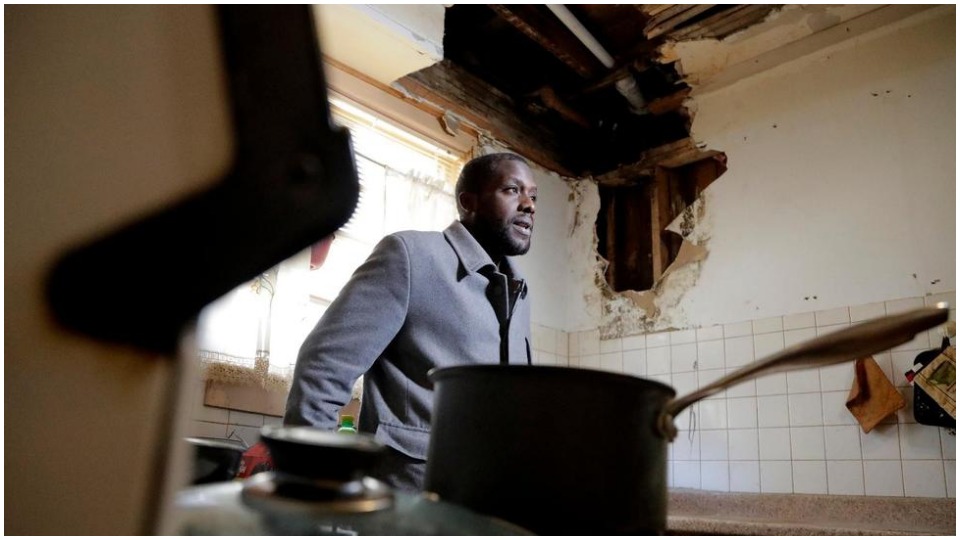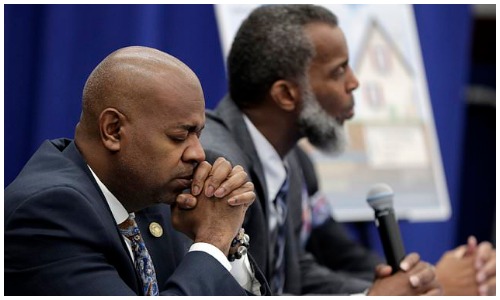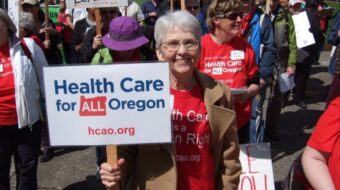
NEWARK, N.J.—The health crisis in Flint, Michigan, where over 100,000 residents were exposed to dangerous levels of lead in the water, prompted lawmakers to test the water of school systems across the country. What we know now is that Flint is not an isolated incident. There are Flints all over the country, cities where simply drinking water from the tap puts the health of residents at risk. Newark, New Jersey, is one of those cities.
Residents here, particularly in working-class neighborhoods, are now demanding that government officials look for solutions to this crisis that go beyond switching to bottled water, installing sink filters, and vague promises of change.
In 2016, it was discovered that at least thirty schools in Newark, the most populated city in New Jersey, showed lead-contaminated water samples. At the time of the findings, John Abeigon, president of the Newark Teachers Union, called Newark a “mini-Flint.” Like that Michigan city, Newark also has a large Black population and high rates of poverty. For close to a year and a half, city officials denied the findings that local water was dangerous. In April 2018, the city’s website went as far as issuing an all-caps statement claiming that Newark’s drinking water was “ABSOLUTELY SAFE TO DRINK.”
Officials have subsequently been forced to relent on that rhetoric after an engineering study commissioned by the city revealed that corrosion control measures to prevent lead from seeping into Newark’s drinking water were not working at Pequannock, one of the city’s two water treatment plants. The federal threshold for action on lead levels is 15 parts per billion, set by the U.S. Environmental Protection Agency. In 2017, more than 22 percent of tested samples from Newark’s water system exceeded that threshold. Mayor Ras Baraka announced in October 2018 that the city would provide water filters for those residents whose homes were impacted by lead.
Despite this admission of dangerous levels of lead in the water, city officials have begun pushing the hashtag #NewarkIsNotFlint across their official social media accounts. At the same press conference where he announced the issuing of water filters to residents, Mayor Baraka proclaimed, “When you make a statement that the drinking water is not safe, it is yelling fire in a crowded room…. In fact, Newark has some of the best drinking water. The problem is that our infrastructure is not safe.” The city also insists that only certain areas of Newark are affected by the high levels of lead.
He has pushed back against the idea that the situations in Newark and Flint are similar, calling comparisons between the two “B.S.” and “a lie.” Further making the case at a November 2018 press conference, he said, “In Flint, they purposely did not put a corrosion control inhibitor in their water. Ours stopped working. That’s a marked and clear difference.
“What they did was purposeful and deliberate, to save money,” he asserted. “Our corrosion control inhibitor stopped working; we found out it stopped working, and we did something about it.”
Residents and activist organizations, however, are not satisfied with the mayor’s approach to what they say amounts to a public health crisis. The Natural Resources Defense Council (NRDC) and the Newark Education Workers Caucus (NEW Caucus) are suing the City of Newark and the Acting Commissioner of the New Jersey Department of Environmental Protection (NJDEP) for what they call a violation of the Safe Drinking Water Act. This is the federal law that protects public drinking water supplies across the nation. At the time of the filing, an attorney for NRDC, Claire Woods, explained, “If it takes filing a lawsuit to end violations of federal drinking water law, we’ll do it.”
The NRDC also pushed back against the city’s assertion that only residents receiving water from the Pequannock Treatment Plant are at risk for high levels of lead. The organization obtained a letter from Mayor Baraka’s office to the state environmental agency that concedes that water from the affected Pequannock Plant is “blending” into areas that receive water from the city’s other treatment facility, the Wanaque Plant.
The grassroots group Newark Water Coalition has embarked on a mission to educate Newark residents on the dangers of lead in the water, along with putting pressure on the city for concrete change. People’s World was able to speak with some of the leaders of the organization, which is made up of Newark residents and activists.
“One of the biggest demands we have,” explained Anthony Diaz, “is that we want everyone tested [for lead] at the city’s expense. We want the city to make it a priority. We also want the city to do an educational campaign because they’re not admitting that the issue is as dangerous and as widespread as it actually is. There are a lot of residents who still think boiling the water is helpful when that only makes it worse. We also want an independent monitor of the water.”
Diaz also addressed the mayor’s assertion regarding the need to fix the infrastructure of the city. “The state needs to fund the Newark infrastructure in its entirety. Mayor Baraka [has claimed] that the fixing of this infrastructure will take five to eight years because they are waiting on $75 million from the state. Supposedly this money has been granted to them, but they’ve been dragging their feet and putting out other contracts,” Diaz explained. “I just read an article about [Governor] Murphy wanting to allocate $2 billion to redo the monorail at the [Newark International] Airport. Why do we have money for those kinds of things, we have money to give to Amazon, but the state drags its feet on this [health crisis],” he said.
As for the home water filters, Diaz described the city’s mismanagement in the issuing of even that inadequate solution. “We’ve had several people complain that the numbers are wrong. We’ve had people complain that when going down to City Hall for the first time to pick up water filters, they are told they’ve already done so, and we know that’s not the case,” he asserted.
Another leader of the group, Sabre Burroughs, spoke about the need for activists to be heard and for residents to be educated on the crisis. “They [city officials] want to make it seem like we’re Chicken Little, screaming that the sky is falling when it’s not. They want to make it look like we’re over-exaggerating, and that the city is doing all it can [to fix this problem]. They want to silence us,” she said. Burroughs asserted that the city should be more forthcoming with information and assistance. “The relationship between the people and the city government has been one-sided, with the people having to constantly demand answers,” she said.

Diaz connected the mayor’s five-to-eight-year plan to fix the water with what he sees as the larger issue of growing gentrification in the city. “The water isn’t going to be fixed for us [Black and brown residents] but in five to eight years, when we’ve been further priced out of the city, it will be fine for the [white affluent] residents that replace us,” he said.
Diaz explained that the Newark Water Coalition wants to work with the mayor, and not against him. “Our consistent message to Mayor Baraka and the administration is: You messed up, we know you messed up, but let’s move forward, and come up with real solutions.” Diaz explained that the Newark Water Coalition is holding regular town hall meetings so residents can speak out, as well as linking up with residents in other cities affected by high levels of lead in the water, such as Flint.
Lead, a potent neurotoxin, can cause irreversible brain damage when accumulated in the body. This can be severely dangerous at high levels for children under the age of six. The city’s official site is now urging Newark residents to have their children screened for the neurotoxin. This is despite the fact that the city fought in court against the expansion of their water filter program that the NRDC called for.
Pick-up locations for water filters for Newark residents can be found here.










